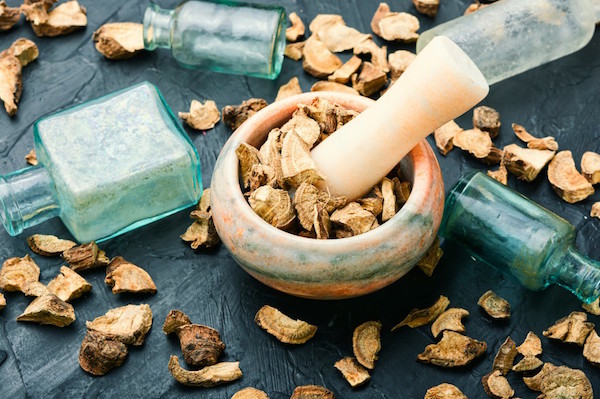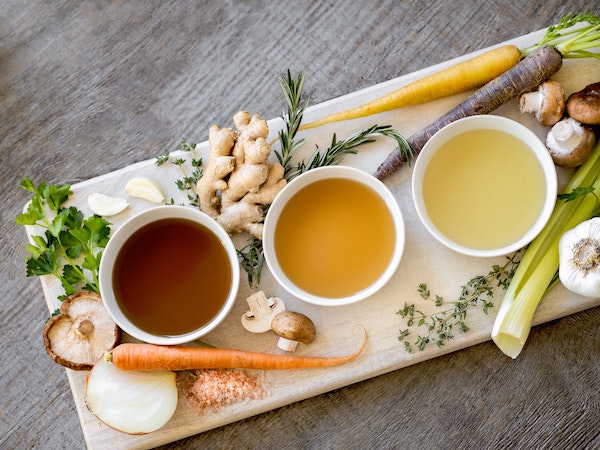Medicinal Herbs for Stress Relief — Bridging the Stress Gap with Adaptogens
Adaptogen herbs are powerful, natural allies that help your body respond to and recover from stress across all phases of the stress cycle.

This piece was originally published in Radiant No. 16, The Self Care Issue.
In our tired, stressed, worn-out world, can herbal medicine help? Yes it can, and in particular a group of herbs known as adaptogens, which can help the body rebalance its physiological systems and resist various types of stress.
Adaptogens have been used for centuries, both in traditional Chinese medicine and in Ayurveda, which has its origins in the Indian subcontinent, as well as in other traditional health systems. After all, life has always been stressful, so people have needed ways to deal with stressors for thousands of years.
A Few Words About the Biology of Stress
When we talk about stress, we often talk about the fight or flight response, because whether we are conscious of it or not, our bodies are choosing one of those responses.
When we are stressed, our bodies go into a state of high alert that involves structures in the brain, the adrenal glands, the heart, the lungs, and the nervous system. Part of the nervous system known as the sympathetic nervous system ramps up, increasing our heart and breathing rates and dilating blood vessels in major muscles so that we can either fight or flee. At the same time, the parasympathetic nervous system , which is associated with our “rest and digest” functions, tries to put the brakes on the sympathetic nervous system.
During periods of stress, the adrenal glands pump out cortisol and adrenaline at high levels, raising blood sugar and blood fat levels. When the stress is chronic or long-term, this response can eventually lead to burnout, also known as adrenal fatigue or sometimes as adrenal insufficiency.
You can think of stress as having three stages: alarm, resistance, and exhaustion. If you are constantly in the alarm phase (which we pretty much all were in 2020) you will eventually enter the resistance phase, where your body adapts to the stress. The resistance phase can last for a variable amount of time depending on your age, overall state of health, and how many other alarms are being sounded—alarms like having to work from home or losing your job, having kids at home and trying to figure out online learning, new viral variants, elections …
Finally, when your body can no longer compensate, you enter the exhaustion phase.
Related Articles:
Adaptogens—Can They Really Help?
The short answer is yes, adaptogens can help anywhere along the stress-phase continuum—but they can’t help on their own! While adaptogens can help support your body in regaining its balance, these herbs work best when you are eating well, resting well, and exercising.
How do adaptogens work? They appear to work on a number of levels both by protecting the nervous system and also by stimulating some aspects of the nervous system to support balance. Adaptogens also affect the immune and hormonal (endocrine) systems. They also tend to relieve aspects of fatigue and can function as antidepressants. In addition, adaptogens appear to reset homeostatic (balance) mechanisms in the body.
[footnote]Panossian A, Wikman G. Effects of Adaptogens on the Central Nervous System and the Molecular Mechanisms Associated with Their Stress-Protective Activity. Pharmaceuticals (Basel). 2010 Jan 19;3(1):188-224. doi: 10.3390/ph3010188. PMID: 27713248; PMCID: PMC3991026. https://www.ncbi.nlm.nih.gov/pmc/articles/PMC3991026/[/footnote]
[footnote]Panossian AG, Efferth T, Shikov AN, Pozharitskaya ON, Kuchta K, Mukherjee PK, Banerjee S, Heinrich M, Wu W, Guo DA, Wagner H. Evolution of the adaptogenic concept from traditional use to medical systems: Pharmacology of stress- and aging-related diseases. Med Res Rev. 2021 Jan;41(1):630-703. doi: 10.1002/med.21743. Epub 2020 Oct 25. PMID: 33103257; PMCID: PMC7756641.https://www.ncbi.nlm.nih.gov/pmc/?term=adaptogens [/footnote]

Examples of Herbal Adaptogens
Many adaptogens come to us from traditional Chinese medicine and Ayurveda. The following are ones with some of the most evidence-based use.
[footnote]Liao LY, He YF, Li L, Meng H, Dong YM, Yi F, Xiao PG. A preliminary review of studies on adaptogens: comparison of their bioactivity in TCM with that of ginseng-like herbs used worldwide. Chinese medicine. 2018 Dec;13(1):1-2. https://link.springer.com/article/10.1186/s13020-018-0214-9 [/footnote]
- Holy Basil is known as tulsi and is widely used in Ayurvedic medicine to reduce the effects of stress. It has been called an “herb for all reasons” because in addition to its adaptogenic properties, tulsi is an anti-inflammatory, can help normalize blood lipids (fats) and blood sugar levels, and may even boost memory and cognitive abilities. It is sometimes called “hot basil” because it has a peppery taste, so you can use it in cooking to spice up your meals!
- Ashwagandha (Withania somnifera) has been used as an adaptogen for centuries in Ayurvedic medicine. It can be used to reduce stress-related anxiety, to promote better sleep, and to help support the immune system. One note of caution: ashwagandha may stimulate the thyroid, so it should be used with caution in anyone with a history of thyroid conditions.
- Panax ginseng, or Asian ginseng, is used to improve memory and cognitive ability, to increase libido, and to alleviate fatigue.
- Schisandra chinensis, also known as five-flavor fruit or the magnolia vine, is used in traditional Chinese medicine as a tonic to support digestion and liver function.
- Eleutherococcus senticosus, or Siberian ginseng, is also known as eleuthero and is used to support heart health and mood. Because it has also been shown to reduce blood sugar levels, it should only be used with caution and under the direction of a healthcare provider in those with diabetes.
- Rhodiola crenulata is also known as rose root or Arctic root. It is used to support mood and to improve recovery from exercise and fatigue.
Other adaptogens include cordyceps, Indian gooseberry, Bacopa, and licorice root (Glycyrrhiza glabra).
Incorporating Adaptogens into Your Daily Routine
Adaptogens can be consumed as a tea, added to smoothies, or taken in the form of supplements. The choice is yours, though each approach has its own advantages and disadvantages.
For example, herbal teas are a great way to relax, but some herbs may have a taste that “takes some getting used to.” If this is the case, you can always add some stevia or a better-tasting herb to mix in with the adaptogen, or get an herbal tincture and add a few drops to hot water.
You can also add either dried or powdered herbs to a smoothie, which can help hide the taste of the herb while providing added nutrients. While this is often a preferred method, it can take a bit of trial and error to get the best flavor combinations. Bananas seem to make every smoothie better, as do mangoes, peaches, and antioxidant-rich berries.
And when it comes to supplements, there are a lot to choose from, but unfortunately not a great deal of regulation. To be on the safe side, it’s best to always purchase from reputable companies.
Also, be sure to follow the product’s specific guidelines in terms of how much herb to add to your tea or smoothies or to take as a supplement. This is another reason to stick with well-known, well-respected suppliers. They can give you guidance on the appropriate amounts to take.
Many people think “If it’s natural, it must be good for me” or “If one is good, two must be better!” but both of these ideas are wrong. For example, cyanide is natural, but it is also a poison. And more of a good thing is not always better: one piece of pie à la mode is good on occasion, but two is not so good, especially if you make a habit of it!
A Final Word
Adaptogens are a great tool to help you through stressful times. More research still needs to be done (isn’t that always the case?) and you should talk to your healthcare provider and pharmacist to check for any possible interactions with medications or health conditions before adding an adaptogen to your health routine.
Download your free digital edition of Radiant at radianthealthmag.com/free.
.





